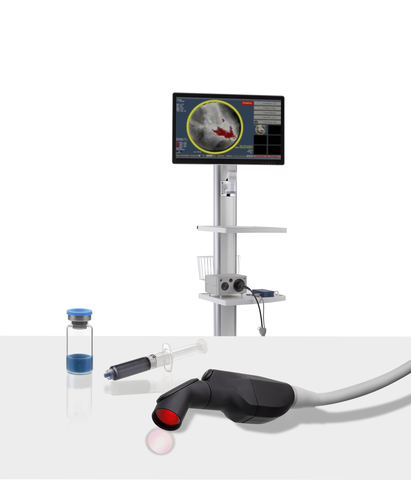NEWTON, Mass.– Lumicell, Inc., a privately held company focused on innovative fluorescence-guided imaging technologies for cancer surgery, today announced a New Drug Application (NDA) for its LUMISIGHT™ Optical Imaging Agent has been submitted to the U.S. Food and Drug Administration (FDA).
LUMISIGHT is intended for use with the Lumicell™ Direct Visualization System (DVS), an investigational system designed to assist in the detection of residual cancerous tissue within the lumpectomy cavity following removal of the primary specimen during breast conserving surgery.
“Lumicell is committed to revolutionizing the way breast cancer surgery is performed and bringing the benefits of the Lumicell Direct Visualization System to breast cancer patients,” said Kevin Hershberger, president and chief executive officer of Lumicell. “Submission of the LUMISIGHT NDA is a significant step toward achieving this goal. We look forward to working with the FDA on acceptance of our LUMISIGHT application for review and submitting the PMA for the Lumicell DVS in the second quarter.”
The LUMISIGHT NDA submission is supported by data from more than 700 breast cancer patients across five clinical studies at top academic and regional community cancer centers. Results from the Investigation of Novel Surgical Imaging for Tumor Excision (INSITE) pivotal trial (NCT03686215) of 406 patients at 14 sites will be presented at the upcoming American Society of Breast Surgeons (ASBrS) annual meeting. The FDA granted LUMISIGHT Fast Track designation and the Lumicell DVS Breakthrough Device designation in recognition of its potential benefit of identifying residual cancer after the initial lumpectomy.
“Data has shown that the risk of local recurrence is directly related to incomplete tumor removal. Currently, at least 20% of women having breast conserving surgery require a second surgery because of positive margins and 6-10% of women with breast cancer experience a local recurrence,” said Barbara Smith, MD, PhD, director of the Breast Program at Massachusetts General Hospital, professor of surgery at Harvard Medical School and lead investigator of the INSITE clinical trial. “As surgeons, technology that helps ensure we are doing everything in our power to remove cancer during the initial lumpectomy gives us and patients greater piece of mind and has the potential to support improved outcomes.”


